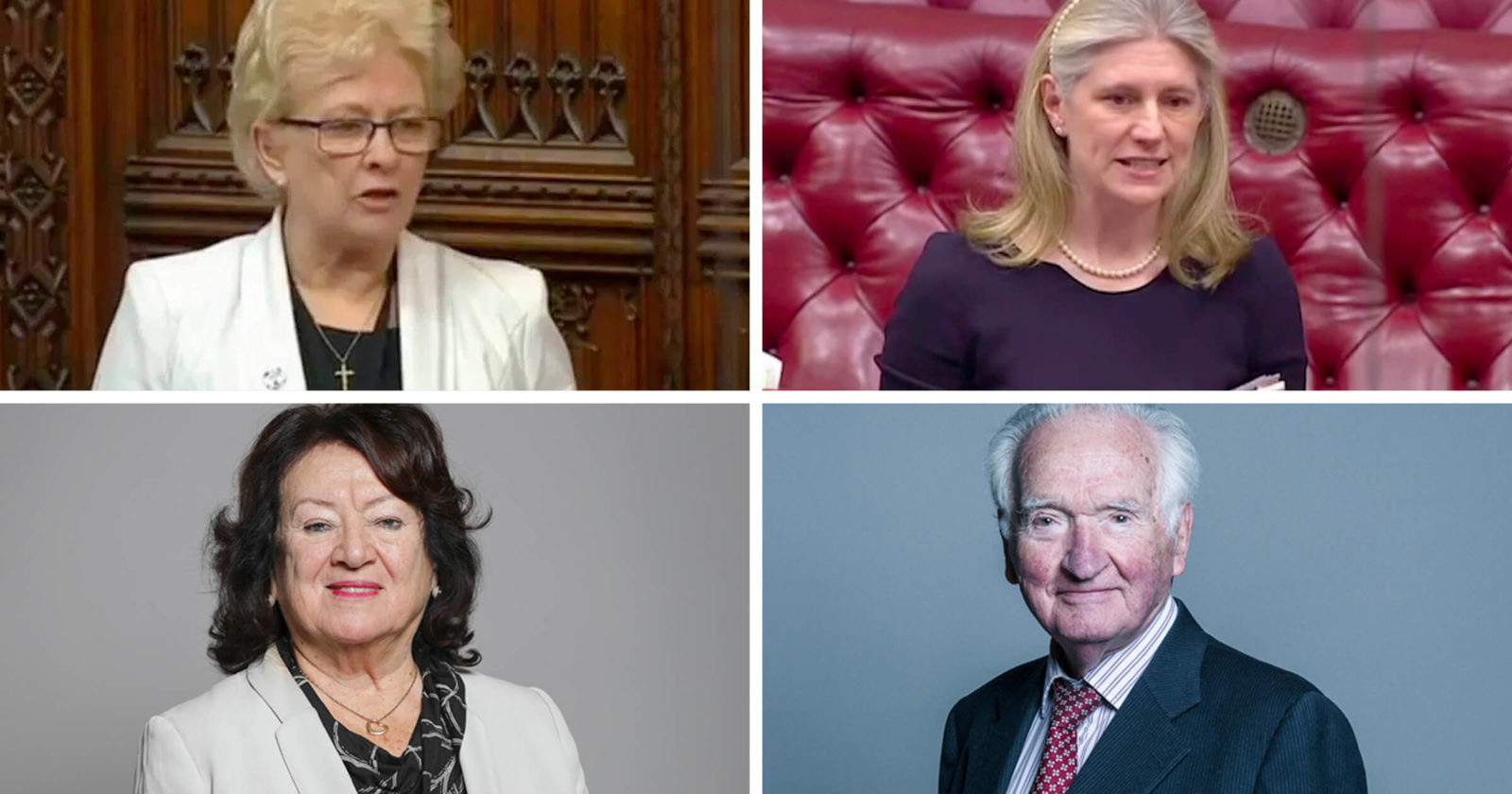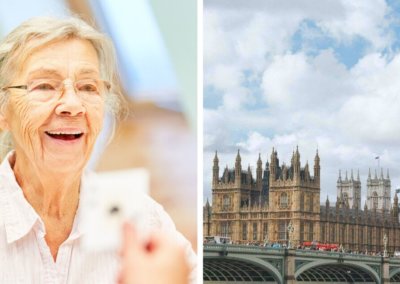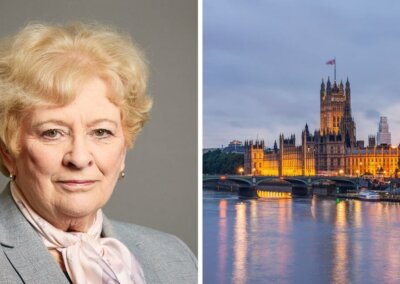Peers in the House of Lords have lined up to condemn the Government over its handling of imposing an extreme abortion regime in Northern Ireland.
In a debate in the House of Lords on Monday 8th June, several Peers spoke boldly about how the UK Government and Parliament has ignored devolution and the people of Northern Ireland.
It is just the latest in a series of criticisms over the past week kickstarted by a House of Lords report raising concerns over the Government’s approach to imposing abortion on Northern Ireland. Criticism then arose from a large group of cross-party MPs in the House of Commons and then again in a Committee debating the legislation.
Sex-selective abortion permitted
Baroness O’Loan criticised the Government for drawing up extreme regulations which go much further than what was required of them.
The former police commissioner brought attention to how the regulations will allow sex-selective abortion to be available on-demand, up to 12 weeks and will discriminate against babies with disability allowing for abortion right up to birth.
Baroness O’Loan has spoken out against the Government’s extreme proposals since they were announced.
Shortly after the initial vote to impose abortion on Northern Ireland, last year, the pro-life peer strongly condemned the vote as being “reminiscent of colonial days” as it undermined the sovereignty of the Northern Ireland Assembly and the people of Northern Ireland to make their own decisions about their own abortion law.
Last week, she launched an open letter calling on MPs to let Northern Ireland decide its own abortion laws – it already has over 13,000 signatures.
Baroness Eaton questioned the Government for ignoring the CEDAW report it claims its Northern Ireland abortion regulations are based on.
She said: “My Lords, will my noble friend the Minister say why Regulation 3, unlike the Abortion Act 1967, makes abortion on the basis of sex lawful in the first 12 weeks of pregnancy?
“Given that it is now possible to know the sex of the foetus between seven and 10 weeks, and that the CEDAW report expressly condemned sex-selective abortion, why does that regulation make it lawful? What meetings have the Government had with the organisation Stop Gendercide in considering how to define these regulations?”
Sex-selective abortion usually targets baby girls due to a preference among certain parents and some cultures for having sons. This is not speculation. This practice is already happening in other countries which have very permissive abortion laws. For example, abortion is available in Canada for any reason and as such, it has been described as a “haven” for parents wishing to have an abortion because their child is a girl.
There is also evidence of this practice in the UK and it is possible that a form of ‘abortion tourism’ will arise as people from other countries seek abortions on the basis of the sex of their child.
Northern Ireland is ‘united against the regulations’
Lord Kilclooney questioned whether the Government is wise to overrule the will of people in Northern Ireland, noting that the majority of the Northern Ireland Assembly are united against the extreme regulations.
He said: “the problem today is whether British parliamentarians—especially English parliamentarians—have the right to impose their standards on a devolved legislature.
“This issue has had a positive result in Northern Ireland, creating cross-community politics: cross-community opposition to the regulations and cross-community support for the regulations. But as has been mentioned, the Northern Ireland Assembly, by 78 votes out of a total membership of 90, united against the regulations.
“Will the Minister say whether the Northern Ireland Assembly has the right to amend the regulations? If the Minister of Health in Northern Ireland, with a mandate to oppose the regulations, takes no action, will Her Majesty’s Government abolish devolution in Northern Ireland?”
Ignoring the other questions the Government spokesperson, Viscount Younger of Leckie, responded that the regulations can be amended in Northern Ireland should that be wished in the future, but elsewhere in the debate reiterated the Government’s intention to implement them in their current extreme form.
‘There are so many ways in which these regulations are concerning’
Baroness Stroud said: “There are so many ways in which these regulations are concerning but, given all that we have been focused on in the last few months around protecting lives equally, it is extraordinary to me that the Government should present such a discriminatory provision, which is in direct violation of paragraph 85 of the CEDAW report.”
Under the new abortion regime (2.1.3), in Northern Ireland, abortion for disabilities will be available through to birth “if the child were born, it would suffer from such physical or mental impairment as to be seriously disabled.”
In England and Wales, wording that has appeared similarly restrictive (‘that there is a substantial risk that if the child were born it would suffer from such physical or mental abnormalities as to be seriously handicapped’) has in practice allowed for abortion for disabilities including Down’s syndrome, cleft lip and club foot.
In England and Wales – where abortion is available up until birth if a baby has a disability – people with disabilities are unjustly and disproportionately targeted by abortion legislation (see video segment here from the BBC Victoria Derbyshire Show where a mother was offered a termination at 38-weeks gestation).
The latest available figures show that 90% of children diagnosed with Down’s syndrome before birth are aborted in England and Wales.
Northern Ireland up to now has had a very different approach. Disability-selective abortion for Down’s syndrome is not permitted and there is a culture of welcoming and supporting people with this disability rather than eliminating them.
This is reflected directly in the latest figures (2016) from the Department of Health in Northern Ireland, which show that while there were 52 children born with Down’s syndrome, in the same year, only 1 child from Northern Ireland with Down’s syndrome was aborted in England and Wales.
Lord Mackay of Clashfern simply questioned why the UK Government would seek to overrule the Executive when they are now happily active again?
Viscount Younger of Leckie said it was good news the Assembly is now up and running but claimed the Government were “obliged” to follow through with imposing the regulations.
However, this claim has been disputed by two of the UK’s top lawyers, Lord Brennan QC and Ian Leist QC, who have questioned the legitimacy of the extreme abortion regime.
In a submission to the House of Lords Committee the pair described last month’s decision to re-table the regulations four months after the restoration of the Northern Ireland Assembly as “constitutionally indefensible”.
They add: “The Government should not have re-tabled but should instead be asking parliament to repeal Section 9. This again is a matter of fundamental legal and political importance that I would suggest must be brought to the attention of the House.”
Repealing section 9 of the regulations would give the people of Northern Ireland the power to decide its own abortion legislation.











